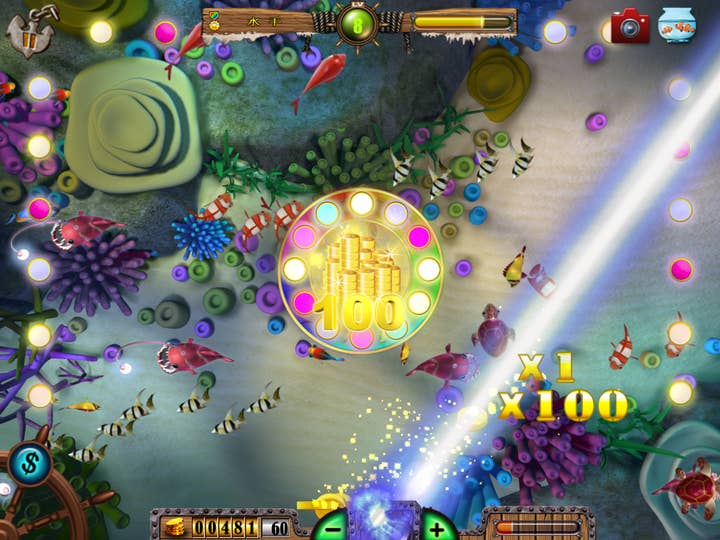Fishing for dollars: CocoaChina brings rapid mobile growth to the West
The publisher of Fishing Joy on open-source development, one-hit wonders and emulating Chinese success
You might not have heard of CocoaChina. Whilst its flagship game has been downloaded well in excess of 100 million times and is making $6 million a month, the Chinese company is still relatively unknown in the West.
That's all set to change. CocoaChina is bringing its considerable presence to bear on the pockets and screens of Europe and the US, operating a business which hopes to run a two way street between the two markets. CocoaChina is hardly the first company with that lucrative global market in its sights, though, so what makes it any more likely to succeed than its competitors?
We sat down with US general manager Lei Zhang at GDC to get the pitch.
The company name is Chukong Technologies. We're based in Beijing. That's the overall umbrella of the company, but under the Chukong brand there are three assets: first there's CocoaChina, and that's the root of the company. It's a website. It's a developer community, so consider that as a Facebook or a MySpace for iOS devs. That's where the company comes from. One of the founders of the company is a geek himself; he writes programs, and he writes a blog about writing those programs, so he started these forums where developers could exchange ideas.

Later on, CocoaChina grew into quite an influential force in the mobile gaming industry in China. We focused on iOS development, and then later expanding into Android and the entire mobile gaming landscape.
The website started in 2008.
Yeah, pretty recent, and we actually grew along with the App Store. It was when the App Store started allowing Chinese developers to upload games, and we were advocating that to the Chinese development community. So CocoaChina is the root, but obviously it doesn't make money, and we're a venture backed company. We need a reasonable business model, and naturally we grew into game development. We had our in-house game studio try different genres - platform, single-player, puzzle, all different things - and fortunately enough we hit the jackpot with this game called Fishing Joy - it's a casual/simulated betting mechanism, so it fits really well with the Chinese audience and it became a big hit in the Chinese mobile game space.
It sort of has an Angry Birds status in China. Up to today, that game has around 200 million installs, mainly in China and Asian countries, and about 140 million of that came from Android. It pretty much reflects Android versus iOS in terms of device activations in China. We have other titles that have had reasonable success, such as Pocket Climber, which is an endless runner that had pretty good acceptance among the media and also from the players in the West.
"The one-time hit, one-time wonder thing is always a pain point for a development studio, so we went into game publishing to mediate that"
The one-time hit, one-time wonder thing is always a pain point for a development studio, so we went into game publishing to mediate that. We publish on behalf of some of the top international and domestic developers. Our publishing partners include Disney Mobile who are publishing Where's My Water, Where's My Perry and Temple Run: Brave for Disney, and also Z2Live, which is on the hardcore MMO end, we will be publishing their Metal Storm franchise in China. Also, our publishing partners include Nexon Mobile, who are publishing Dungeon & Fighters, which is known as Dungeon Fighter Online in the West, we're producing a mobile version for them in China. And also Konami's Contra.
So the second part of the business is game development and game publishing. We're pretty much indisputable as number one in terms of the revenue scale, in terms of reach in game publishing and distribution on the mobile side - smartphones.
The third part of the business is the game engine, which is called Cocos2d-x. It is a very popular iPhone game engine developed by two great engineers in South America - later on the two gentlemen were hired by Zynga, so that's where they are working right now. Cocos2d-x is a cross-platform extension for Cocos2d for iPhone, and these two open-source projects and communities are working very, very closely to define this entire roadmap for the Cocos2d family.
Cocos2d-x basically allows developers to write their game using C++ or Lua or JavaScript once, and then the same game can run for all different platforms. It supports Android, iOS, Windows Phone, Chrome, even Bada, all different operating systems. That project is open-source and it's completely funded by us... so that is our way to give back to the industry in another form. The forum, CocoaChina, creates this environment, this knowledge base and exchange community.
"We believe that cross-platform is the future of mobile"
There are two reasons why we do that: the first is that we believe that cross-platform is the future of mobile. Over here, in the US, in terms of revenue it's still iOS heavy. For most studios, they're seeing 70 per cent of their revenue coming from iOS, and some studios are purely iOS focused. But in China, we're already seeing for casual titles probably 80 to 90 per cent coming from Android. For the MMO titles it's maybe half and half, or a little bit heavier on the Android side, but the trend is that Android will take the lead in terms of activations, downloads and revenue.
So that is the one reason why we think providing this easy access to a free toolset, allowing developers to have this cross-platform support from the ground up, we think this is something that will grow the industry. This is a free project: it's not like Unity, it's not license-based. Our financial benefit from doing that is more to gain trust from the industry, from the developers.
Engagement, exactly. So, for instance, Contra is developed by Konami's Shanghai studio using Cocos2d-x, so naturally they trust us and allow us to publish the game for them. That's one great example, but there are other games published by us that were developed by Cocos2d-x.
"I think in the past, there was a very strong barrier between the West and East, for two reasons: first is culture, second is distribution"
Absolutely. I think in the past, there was a very strong barrier between the West and East, for two reasons: first is culture, second is distribution. In the online world, and even in the PC world, really there was no distribution channel for Western developers to get into China, except for either a joint venture or a deep strategic level of collaboration. That was really changed by Apple, which created a really global platform for any developer to publish their games.
On the culture side that difference still exists, but I would say in a lesser percentage in terms of genres. So in the past, when we talk about games we talk about Warcraft, right? But maybe in Asia it's Dungeon Fighter, in China it's Three Kingdoms. It was very, very separated. Of course, Warcraft has a large audience worldwide, but Three Kingdoms will definitely not be able to enter the US market - that's a very specific historical period in China.
So that particular audience or demographic, who are playing RPG games, they still have that kind of divide. For instance, a 2D, side-scrolling MMORPG like Dungeon Fighter, I'm not sure that will have a big audience in the US. We'd like to try. We have many, many Chinese developers making games that are very high quality, and we'll see if the market will accept that, but probably not.
But for Angry Birds, for Candy Crush, for Fruit Ninja, and hopefully for our Fishing Joy, I think that has a very neutral cultural background and should have a global appearance, inherently. That's something we're seeing more - for instance, Where's My Water? is seeing huge success in China, and we're hoping Fishing Joy will have a huge success in the West also.

Exactly, yes. Obviously the so-called Kakao model is booming in Korea and is hitting the world. So this isn't on the cultural or distribution layer any more, it's more on the monetisation or social layer. But that model seems to be universal. Many Chinese developers are getting to learn that model and bring that into their games. Many US developers are doing that, too.
It's case by case. Certain titles, for instance Where's My Water?, has an in-app purchase mechanism, but it's mainly just to unlock. So for these type of games, deep down there's no risk of this kind of difference, in terms of acceptance for players purchasing virtual currencies.
For MMO, for sure, there is a very different spending pattern for Chinese players. They don't feel shy about buying advantages in the game, which is not the case in the West. With Western games, like Clash of Clans, they have a paywall at a much, much later stage, but that paywall you can probably climb up very slowly anyway. In China, that kind of opportunity doesn't really exist. Usually, when the player starts to get into the game they'll spend money to get advantage and privilege in the game.
"There is a very different spending pattern for Chinese players. They don't feel shy about buying advantages in the game, which is not the case in the West"
So that difference exists, but not necessarily in all games. Deep down, it's still the game design, the art, the depth of the content that really speaks. For instance, Clash of Clans is in the top ten grossing in China in iOS, without any localisation, I would say, and without any adjustment to the payment system. It has been accepted by players, not only in downloads but also in revenue. So it's case by case.
That's a correct observation. Absolutely, the flow is more towards China, and less from China to the rest of the world. But just in the last few months, the trend is at least shifting. First of all, the freemium model came from Asia, so they're pretty strong with it and many game studios are very strong at doing MMO type of games and they had success in Facebook in the early days.
Even some of the international publishers, they are going to China right now to look for games to bring to the Western market. So, in the next few months, not only us, but you'll see that from many publishers, and you probably won't even tell that it's a game from a Chinese developer, but these games will enter the Western market.

